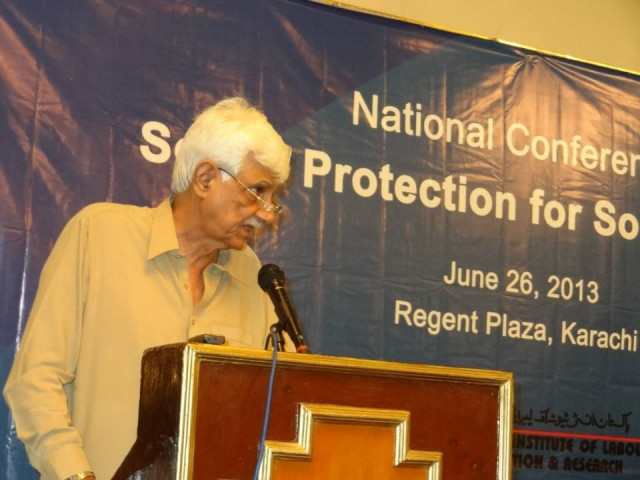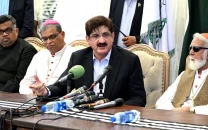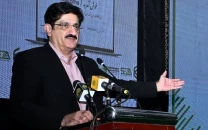Poor public policy: Social protection will bring an end to lawlessness, say experts
PILER organises conference on social protection for social justice.

PPP leader Taj Haider addressing the National Conference on Social Protection for Social Justice. PHOTO: FACEBOOK/SHUJAUDDIN QURESHI
These views were shared by the executive director of Pakistan Institute of Labour Education and Research (Piler), Karamat Ali, during a conference on social protection for social justice on Wednesday.
Condemning the attack on Justice Maqbool Baqar, he said that terrorists thrive in those areas where people have no land rights or no opportunity to make a living. “I don’t think that a man with a job and some education would blow himself up in a suicide attack.” Calling the state anti-labour, he alleged that a certain class of people wanted to maintain poverty for their own benefits.
A large number of economists, politicians and civil society activists, who attended the conference organised by Piler, stressed the need for a significant course of action to ensure social security for the masses. The speakers said that rather than focusing efforts on creating awareness, what was needed was proper action without any biases.

Aga Khan University Social and Behavioural Sciences division head Kausar S Khan, in her speech, said that health meant prosperity according to the World Health Organisation’s 1978 declaration. “People are conscious that good health leads to mental, social, physical and economic prosperity. Moreover, only the poor are capable of assessing the levels of poverty rightly,” she said.
Former chief economist of the planning commission Dr Pervez Tahir gave a presentation on the costs of social protection. Talking about last year’s budget, Tahir said that the government had spent Rs432.1 billion on education, Rs139.5 billion on health, Rs36.6 billion on water supply, Rs5.6 billion on reproductive health and Rs0.4 billion on low-cost housing.
A development economist from India, Prof. KP Kannan, shared his experiences about the social security policy in his country. He called for devising a universal social security programme and a national minimum wage system that no province in a country could deviate from. He spoke about the India’s National Rural Employment Programme, under which people in the rural areas were given jobs cards.
Dr Aly Ercelan of Piler said that a majority of the population, especially children, were illiterate, as they did not have access to education. He also shed light on fishermen’s livelihoods, which were being affected by increasing water pollution. “When we talk about social protection, we should discuss the rights of peasants and fishermen, who are losing natural sources of livelihood and have no access to welfare facilities.”
National Rural Support Programme micro insurance manager Jawed Rehmani highlighted the micro insurance mechanism operating in 58 districts of the country. Planning Commission of Pakistan’s former member of the social sector, Saba Gul Khattak, evaluated different schemes and programmes launched by different governments in the country Pakistan People’s Party leader Taj Haider, Senator Saeed Ghani, Jamaat-e-Islami’s Asadullah Bhutto, Pakistan Muslim League Nawaz’s leader Khawaja Tariq Nazir also spoke.
Published in The Express Tribune, June 28th, 2013.



















COMMENTS
Comments are moderated and generally will be posted if they are on-topic and not abusive.
For more information, please see our Comments FAQ